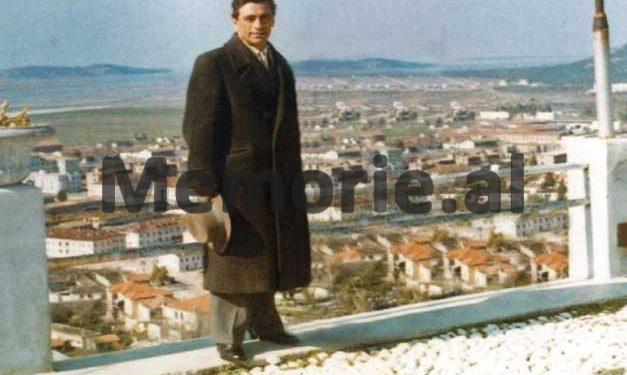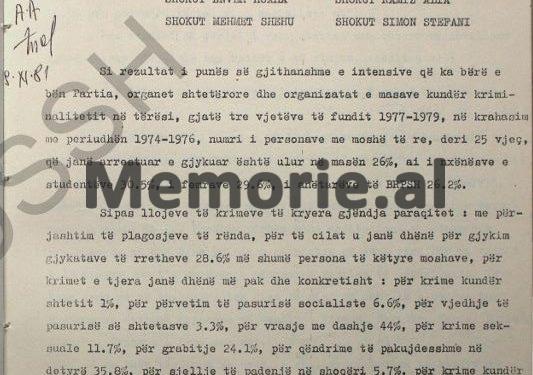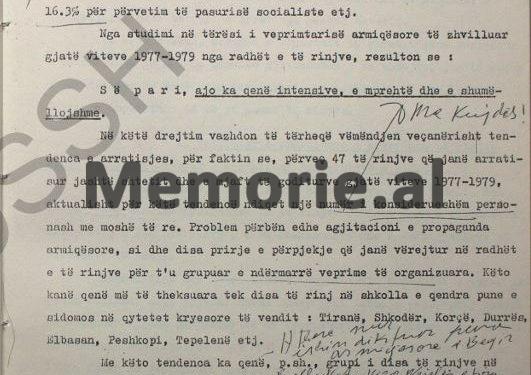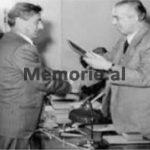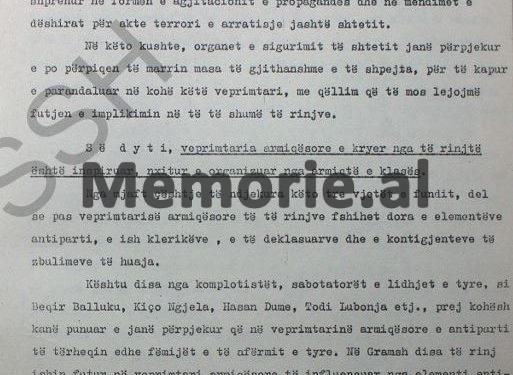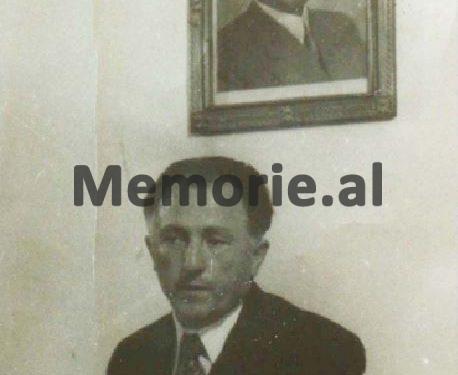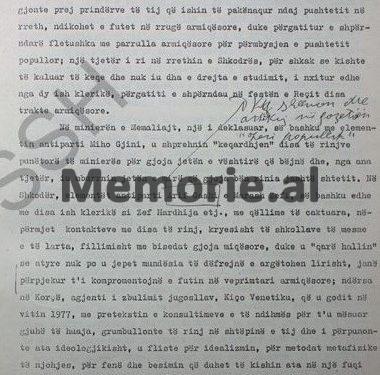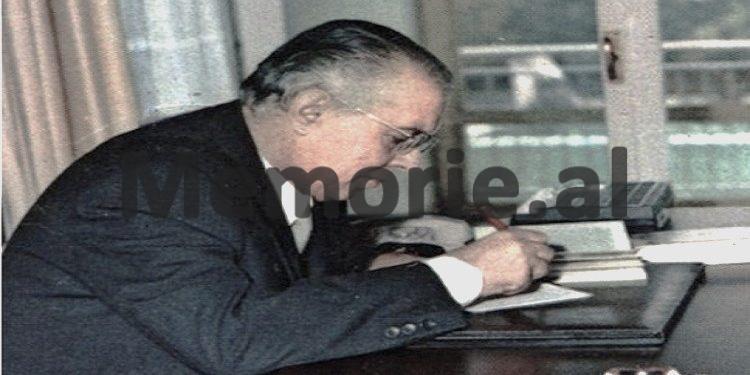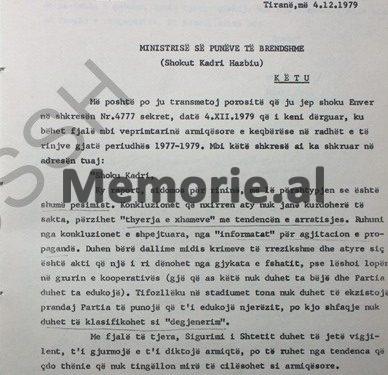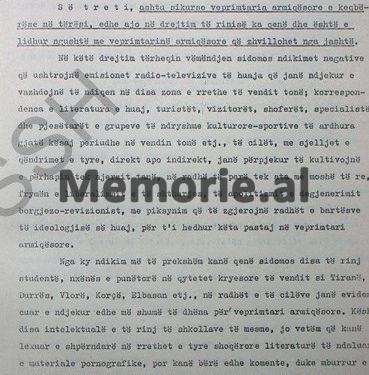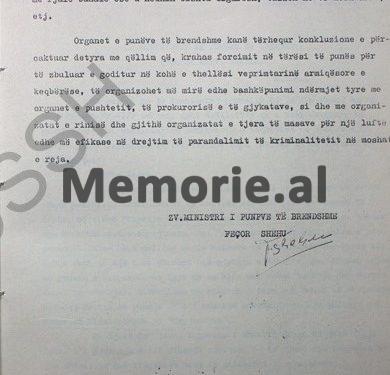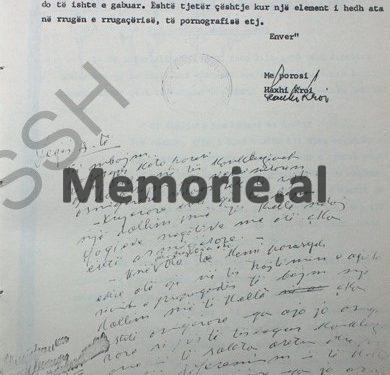By Dashnor Kaloçi
Memorie.al / Just as it had happened in 1949, when official Tirana immediately broke off and severed friendly relations with Josif Broz Tito’s Yugoslavia, in 1956 with the Tirana Conference, when the Kremlin leadership denounced the crimes and cult of Stalin, or in 1961, with the final interruption of official relations with Nikita Khrushchev’s Soviet Union, in 1979, on the occasion of the breakup of relations with the People’s Republic of China, in order to prevent any unpleasant situation that could arise from the revival of the “class enemy”, the organs of Internal Affairs and State Security significantly increased their vigilance and intensified their work, arresting, convicting and deporting hundreds of people, mainly from the “overthrown classes”, who were expecting a change in the political situation in the country, since the high leadership of The Albanian People’s Party, led by Enver Hoxha, were now left alone and without support in the international arena, as Mao Zedong’s China had been since 1961, when it finally broke away from Moscow.
This, that is, the strikes, arrests and mass punishments of “declassed elements” and not only, is also evident from this archival document with the acronym “Secret” that we are publishing, (which is being published for the first time), where only for the period 1977-1979, for a period of three years, the organs of the Dictatorship of the Proletariat, arrested and sentenced 110 young people, (aged 14 to 25 years old) all for political crimes. Not counting here, 310 young people of this age, who were “advised” by the State Security organs, as well as 30 others, who were “unmasked” in neighborhoods, schools, military units, or work and production centers.
All this situation, which is summarized in an information report of the Ministry of Internal Affairs entitled; “On the hostile and malicious activity among the youth, during the period 1977-1979”, signed by Deputy Minister Feçor Shehu, was sent to the highest leadership of the Albanian People’s Party, presenting it to the main leader, Enver Hoxha, and the other three secretaries of the Central Committee, Mehmet Shehu, Ramiz Ali and Simon Stefani, (Hysni Kapo had been dead for three months).
But, the situation that is reflected in that information report dated December 4, 1979, seems and most likely that, not only did Enver Hoxha not like it at all, but on the contrary, he was extremely irritated by the figures given by the Ministry of Internal Affairs (for arrests, sentences and internments), so much so that unlike other times, when Enver encouraged and congratulated them for the work done in terms of cracking down on hostile activity, this time he harshly criticized them, not only for the large number of people convicted, but he went into detail about the accusations made against them, saying that; “windows breaking should not be confused with agitation and propaganda”, or; “a young man who let a cow loose in the cooperative’s wheat plot should not be punished”, etc., etc.
In his response to Minister Kadri Hazbiu, in addition to the notes he made from the beginning to the end of the information report, Enver Hoxha also made a special response (dictating it to his secretary, Haxhi Kroi), where he also spoke about specific names, as in the case of Professor Arif Gashi in the city of Shkodra, openly defending him, where he writes, among other things: “I don’t know what Arif Gashi does, but I have read in ‘Zëri i Popullit’ articles against religion, against idealism, etc., prepared by him. If I am not mistaken, Arifi is a professor in Shkodra, precisely to teach philosophy and, when he explains this, he will also talk about idealistic ideologies, otherwise these are not fought”!
As with Arif Gashi, Enver Hoxha has reacted and made notes in that part of the information report, which talks about the arrest and sentencing of a group of young people in the city of Tirana, in 1978 (led by Valer Dyrzi, Viron Dume, Sokol Kiç Ngjela, Vladimir Beqir Balluku, etc.), where he asks for more information about them!
It is not known exactly whether this information report from the Ministry of Internal Affairs headed by Kadri Hazbiu, which “incited and exacerbated the situation”, had any impact, highlighting in a way: “the hostility of the people towards the Party line”, but it is a fact that, just four months later (April 26, 1980), Enver Hoxha made the decision and removed Kadri Hazbiu from the Ministry of Internal Affairs (which he had headed since 1953), giving him the portfolio of Minister of People’s Defense, a post that had been held by Mehmet Shehu since 1974, whom Enver also seemed to see as having gained too much power!
While these are and remain only within the framework of assumptions (which need to be investigated, analyzed and elaborated further), for more about the report-information in question, which led to the “clash”, or deep conflict between Enver Hoxha and Kadri Hazbiu, we can find out from the document in question.
ARCHIVE DOCUMENT WITH THE SECRET REPORT-INFORMATION SENT TO ENVER HOXHA BY THE MINISTRY OF INTERNAL AFFAIRS, RELATED TO THE ARRESTS, CONVICTIONS AND INTERNSHIPS MADE IN YOUTH GROUPS, IN THE YEARS 1977-1979!
SOCIALIST PEOPLE’S REPUBLIC OF ALBANIA S E C R E T
MINISTRY OF INTERNAL AFFAIRSCOMRADE ENVER HOXHA COMRADE RAMIZ ALIA
COMRADE MEHMET SHEHU COMRADE SIMON STEFANI
As a result of the comprehensive and intensive work carried out by the Party, state bodies and anti-crime organizations as a whole, during the last three years, 1977-1979, compared to the period 1974-1976, the number of young people, up to 25 years old, who have been arrested and tried, has decreased by 26%, that of pupils and students by 35.5%, of women by 29.6%, of members of the Albanian Anti-Crime League by 26.2%.
According to the types of crimes committed, the situation is as follows: with the exception of serious injuries, for which 28.6% more persons of these ages were given for trial in district courts, for other crimes fewer were given and specifically: for crimes against the state 1%, for embezzlement of socialist property 6.6%, for theft of property of citizens 3.3%, for murder with intent 44%, for sexual crimes 11.7%, for robbery 21.4%, for negligent conduct in duty 35.8%, for unworthy behavior in society 5.7%, for crimes against morality 5% and for other crimes, 60.6%, less.
However, the participation and involvement of persons of these ages in hostile and criminal activities (taking into account those convicted by neighborhood and village courts, their number has been increasing), constitutes a sharp and quite worrying problem.
On hostile activity
During the period 1977-1979, 110 young people were arrested and convicted for hostile activity, 31 were exposed and 307 were counseled. Currently, from the ranks of the enemy element up to 25 years of age, the Security organs are pursuing 22 active cases, of which 43.4%, for agitation and propaganda, 23.7%, for escape tendencies, 5.7% for espionage, 16.3% for appropriation of socialist property, etc. From the overall study of hostile activity developed during the years 1977-1979, from the ranks of young people, it results that:
First, it has been intense, sharp and diverse.
In this regard, the tendency of escape continues to attract particular attention, due to the fact that in addition to the 47 young people who have escaped abroad and those who were severely affected during the years 1977-1979, currently this tendency is followed by a considerable number of young people. Agitation and hostile propaganda also constitute a problem, as well as some tendencies and attempts that have been observed among young people to group and undertake organized actions. These have been more pronounced among some young people in schools and work centers, especially in the main cities of the country: Tirana, Shkodër, Korçë, Durrës, Elbasan, Peshkopi, Tepelenë, etc.
These tendencies have been, for example, the group of several young people in the city of Tirana, led by Valer Dyrzi, Viron Dume, Sokol Ngjela, Vladimir Balluku, etc., discovered and cracked down on in 1978, where many other young people, aged 20 to 25, were also implicated. They had been involved in this activity since they were still in high school, initially giving themselves over to a debauched life, organizing evenings with decadent music and dancing, etc., and then gradually moving into sharp hostile activity, in the form of harsh propaganda in various directions, especially with the aim of leading the Party and the state and expressing thoughts of committing acts of terror and escaping abroad.
It is characteristic that these hostile groups discovered and struck during these 3 years were initially created with 2-3 people, then expanding to 10 and more people, who have gradually passed from ordinary acts, to sharp hostile activity expressed in the form of agitation and propaganda and in thoughts and desires for acts of terror and escape abroad.
Under these conditions, the State Security organs have tried and are trying to take comprehensive and rapid measures, to catch and prevent this activity in time, in order to not allow the introduction and implication in it, of many young people.
Secondly: the hostile activity carried out by the young people, has been inspired, incited and organized, by the enemies of the class.
From many cases followed up in the last three years, it appears that behind the hostile activity of the young people, the hand of anti-party elements, former clerics, declassed people and contingents of foreign intelligence agencies is hidden. Thus, some of the conspirators, saboteurs and their connections, such as Beqir Balluku, Kiço Ngjela, Hasan Dume, Todi Lubonja etc., have long worked and have tried to attract their children and relatives to hostile and anti-party activity.
In Gramsh, some young people were involved in hostile activity, influenced by the anti-party element, Fadil Spahiu, who constantly spoke to them about a debauched life; in Berat, the children of several kulaks and former kulaks, inspired by the hostile activity carried out by their parents and relatives, became so deeply involved in this activity that they created a criminal organization, making plans to expand it and to jointly undertake sharp acts of terror and diversion at the Berat Textile Plant; in Pogradec, according to the depositions made by a defendant to the investigator, it appears that he had also made the hostile propaganda made by his brother and mother, who had escaped and repatriated, the subject of conversations with a group of young people; a young man in Lushnje, influenced by the constant hostile expressions he heard from his parents, who were dissatisfied with the authorities in the district, was influenced and embarked on a hostile path, preparing and distributing leaflets with hostile slogans for the overthrow of the people’s government; Another young man in the city of Shkodra, because he had a bad past and was not given the right to study, encouraged by two former clergymen, prepared and distributed some hostile tracts on the feast of Reç.
In the Memaliaj mine, a declassed person together with the anti-party element, Miho Gjini, expressed “pity” to some young workers of the mine, for the supposedly difficult life they lead and, on the other hand, they boasted about the supposedly good life that the youth lead abroad.
In Shkodra, anti-party elements Arif Gashi and Marsha Zefi, along with some former clerics, such as Zef Hardhija, etc., with specific goals, through contacts with some young people, mainly from high schools and universities, initially with supposedly friendly conversations, “crying out their troubles” that they were not given the opportunity to have fun and have fun freely, are trying to compromise them and involve them in hostile activities; while in Korça, the Yugoslav intelligence agent, Kiço Venetiku, who was shot in 1977, under the pretext of consulting and helping them learn foreign languages, gathered young people in his house and processed them ideologically, spoke to them about idealism, about metaphysical methods of knowledge, about religion and the belief that they should have in a supernatural power and, on many occasions, sometimes in a camouflaged way and sometimes openly, spoke against the Party and the popular power.
In this circumstance, based on the continuous messages of the Party, the Security organs have drawn conclusions and are deepening the work to discover in time and strike hard, first of all, the consistent enemy element, which tries to attract the youth to its hostile activity, as well as those young people themselves, with a hostile background and current attitude, saving through counseling the people who fall victim to this activity.
Third: just as hostile and malicious activity in general, so too that directed at youth has been and is closely linked to hostile activity taking place abroad.
In this regard, attention is particularly drawn to the negative influences exerted by radio and television broadcasts of foreign stations, which have been and continue to be followed in some districts of our country, foreign correspondence and literature, tourists, visitors, drivers, specialists and members of various cultural and sports groups, who came to our country during this period, etc., who, with their behavior and attitudes, directly or indirectly, have tried to cultivate and spread among our people, primarily among those of a young age, the spirit of liberalism and debauchery, of politicization and bourgeois-revisionist degeneration, with the aim of expanding the ranks of bearers of foreign ideology, in order to then throw these into hostile activity.
This influence has been most noticeable among some young students, pupils and workers in the main cities of the country, such as Tirana, Durrës, Vlorë, Korçë, Elbasan, etc., among whose ranks even more data on hostile activities have been evidenced and followed. Thus, some young intellectuals from high schools have not only read and distributed forbidden literature and pornographic materials in their social circles, but have also made comments, boasting and praising representatives of decadent art and literature of the West: some young people from the Higher Institute of Arts imitate foreign singers, some others from the Faculty of Foreign Languages have organized evenings of entertainment with recorded decadent music and debauched dances. There are also many other young people who, in their clothing, behavior and attitudes, try to imitate the tastes of youth in bourgeois and revisionist countries.
In connection with the above, the State Security organs are tasked with more carefully identifying these negative influences and raising more problems of this nature before the Party organs, in the center and in the districts, in order that, in addition to the continuous strengthening of political-ideological work with the youth, appropriate measures may be taken to increasingly narrow their negative effects.
II On delinquent activity
During the last three years, 1977-1979, 8511 young people (14-25 years old) have been involved in delinquent activity, of whom 4966 have been criminally convicted by district courts and 3218, with administrative measures by neighborhood and village courts. The most widespread criminal activity among young people, especially theft of socialist property and citizens, careless attitude to duty, unworthy behavior in society, crimes against morality, etc., have been in the districts of Tirana, Elbasan, Durrës, Vlorë, Shkodër, Berat, Fier, Korçë and Krujë. In Tirana, for example, during 1978 alone, the element from young people accounted for 53% of all participants in crimes, the vast majority of whom were arrested and convicted for the crime of embezzlement of citizens’ property and, mainly, theft of bicycles, pickpockets and apartments.
Often these crimes are also committed in organized groups, such as the case of the thief Neim H….., who together with 4 others, had stolen 26 bicycles, that of the group led by Budjon A….., who confirmed 12 cases of bicycle thefts, which he sold in different districts of the country, etc. Among young people who have committed various crimes, in addition to those with a pronounced social danger, such as repeat offenders and parasites, a very worrying problem is the implication in criminal activity of school students, because during the last three years, 1977-1979, 2052 students have been sentenced, of whom 356 with criminal activity measures and 1667 students under 14 years of age.
As a result of the insufficient work done by the family and school, youth and pioneer organizations, to educate children and young people with a love of work and patriotism to serve where there is a need, there are still many young people who have graduated from eight-year and secondary schools, who remain unemployed and refuse to go to agriculture, mining, construction and other sectors where material goods are produced. In some secondary schools, the harmful concept is also being cultivated that: “whether we learn or not, it is the same, since the green belt awaits us” (this refers to the agricultural sector).
In addition to hostile and malicious activity, among many young people, especially in the districts of Tirana, Elbasan, Shkodër, Gjirokastër, Krujë, etc., although to a more limited extent, some negative phenomena of external appearance, extravagant fashion, clothing, long hair, etc., which are contrary to our socialist ethics, as well as unworthy behavior and disruption of order and peace, continue to appear. In some cases, these phenomena have taken sharp forms and have created concerns.
Such was, for example, the case of three young men at the “Stalin” Textile Combine, who during a performance at the “Petro Nini Luarasi” School’s Club, went so far as to beat up students; the case of the “fans” of Tirana on the train, when they were returning from the football match with Kavaja, who manifested scandalous acts of hooliganism, throwing stones at citizens and breaking the windows of the train and its furniture and equipment; or the act of a group of young men in Tirana who, for no reason, attacked students at the school for the deaf and dumb, hitting them with fists, stones, etc.
Such negative tendencies, phenomena and manifestations have been manifested more in clubs, sidewalks, parks, stadiums, cinemas, theatres and in urban line stations, in urban buses and railway stations, where many of these young people with these tendencies, in small groups, with messy hair and clothing, standing in these places, hold offensive attitudes towards passers-by, harass women, speak to them in banal words, or throw cigarette butts at them, mock the elderly, etc.
The Internal Affairs bodies have drawn conclusions and defined tasks in order to, in addition to strengthening the overall work, to detect and strike in time and depth hostile and malicious activity, better organize the cooperation between them with the government bodies, the Prosecutor’s Office and the courts, as well as with youth organizations and all other mass organizations, for an even more efficient fight in terms of preventing crime among young people.
DEPUTY MINISTER OF INTERNAL AFFAIRS
FEÇOR SHEHU
ARCHIVE DOCUMENT WITH THE LETTER OF ENVER HOXHA, SENT TO THE MINISTER OF INTERNAL AFFAIRS KADRI HAZBIU, RELATED TO THE REPORT-INFORMATION SENT TO HIS ADDRESS, BY DEPUTY MINISTER OF INTERIOR FEÇOR SHEHU
PARTY OF LABOR OF ALBANIA
MINISTRY OF INTERNAL AFFAIRS
A distinction must be made between dangerous crimes and those such as the act of a young man being punished by the village court for letting a cow loose in the cooperative’s grain (which he should not do either, and the Party should educate him). Typhoid fever in our stadiums should not exist, so the Party should work to educate people, but this manifestation should not be classified as “degeneration”.
In other words, the State Security must be vigilant, track down and dictate to enemies, while guarding against the tendency, that not every statement that does not sound good should be considered hostile. I do not know what Arif Gashi does, but I have read in “Zërin i Popullit” articles against religion, against idealism, etc., prepared by him. If I’m not mistaken, Arifi is a professor in Shkodra, precisely to teach philosophy and, when he explains this, he will also talk about idealistic ideologies, otherwise these are not fought.
Or to judge and classify another teacher as an enemy, because he tells young students that; “we should also have fun”. This would be wrong. It is another matter when an element throws them on the path of hooliganism, pornography, etc. Memorie.al
Enver




